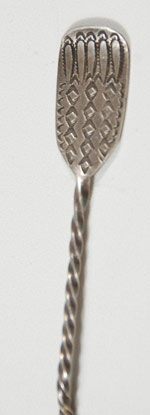Nineteenth Century Silver Navajo Spoon [R]
+ Add to my watchlist Forward to Friend
Forward to Friend
- Category: Silverware - Flatware
- Origin: Diné of the Navajo Nation
- Medium: silver
- Size: 3-7/8” long
- Item # C3393A
- Price No Longer Available

The earliest dated silver spoon known to have been made by a Navajo was in 1885 and that was documented by Charles Lummis in his voluminous notes on file in the Southwest Museum. Spoons were a favored object of tourists travelling on the AT&SF Railroad that reached Santa Fe (actually, Lamy) New Mexico in 1879.
Potters, at that time, were making large pottery vessels because that was what they were used to making for their own use and expected the train tourists to need the same size for use at home. It was not readily understood that the tourists were seeking souvenirs, not functional items. That is where the highly decorated silver spoons developed. They were perfect items for tourists to drop in a carry-on purse or bag and take back home as a reminder of where they had ventured on vacation. They were the perfect souvenir.

This spoon features a twisted handle, with a flat section at the end of the handle and a stamped bowl at the other end. According to Cindra Kline in Navajo Spoons "Twisted handles were so popular in commercial spoon designs of the 1880s and 1890s that they were one of the features of the Robbins Company's 1904 commercial 'Navajo Spoons" [catalog] and were offered in Indian trader catalogs as late as 1906. Trader J. B. Moore promoted twisted handles as providing 'extra strength.' In addition, the end result was quite pretty."
Condition: original condition
Provenance:
- ex Kim Lowndes collection
- Alan Kessler Gallery, Santa Fe
- private collection of a Virginia family
Recommended Reading; Navajo Spoons: Indian Artistry and the Souvenir Trade, 1880s - 1940s by Cindra Kline
- Category: Silverware - Flatware
- Origin: Diné of the Navajo Nation
- Medium: silver
- Size: 3-7/8” long
- Item # C3393A
- Price No Longer Available



